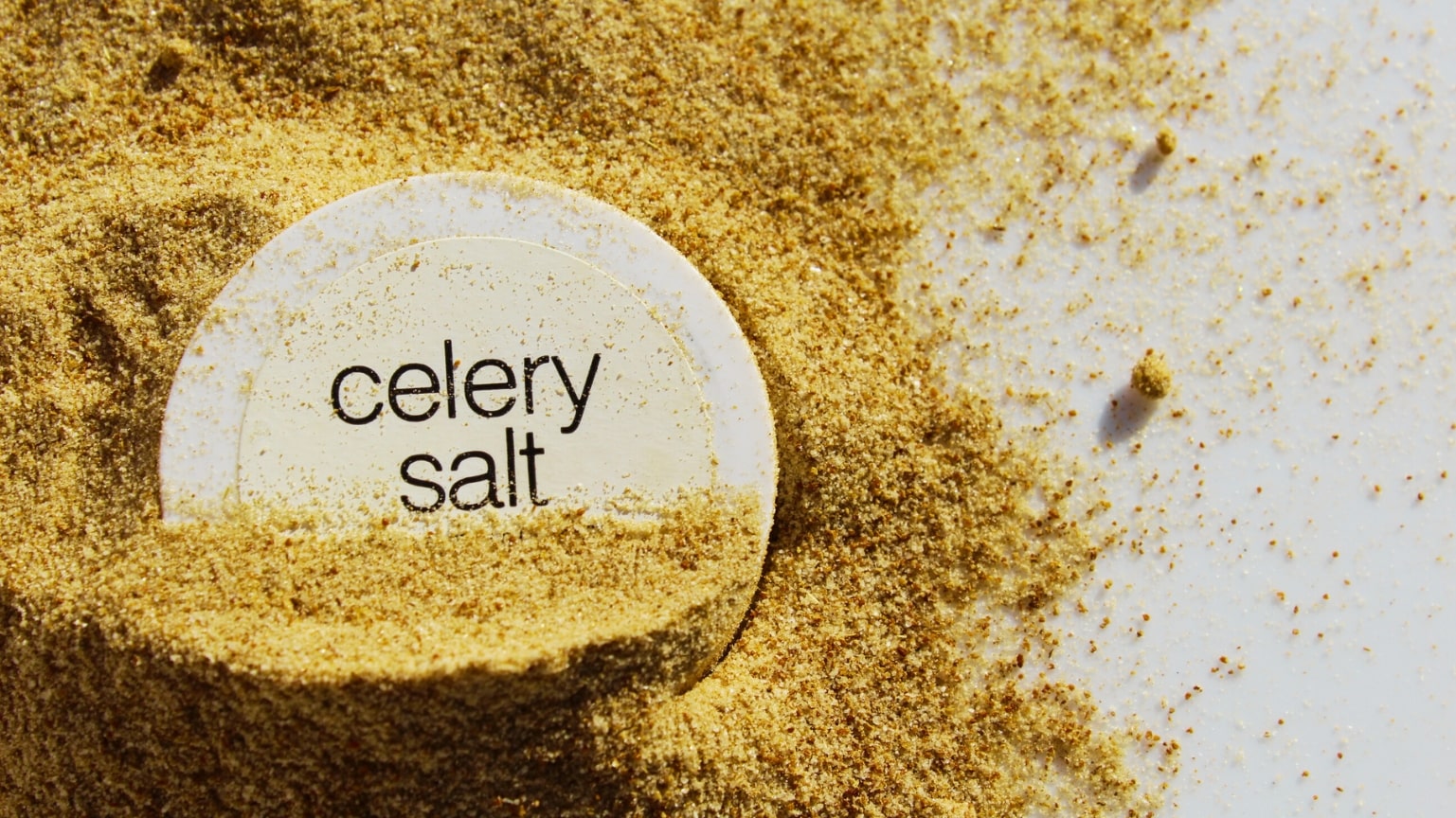
Introduction
Celery salt, a seemingly modest seasoning found on the shelves of spice aisles, holds a depth of flavor and culinary history often overlooked. Derived from the humble celery plant, this aromatic blend combines the earthy essence of celery with the purity of salt, creating a versatile seasoning prized by chefs and home cooks alike. In this exploration, we delve into the origins, composition, uses, and cultural significance of celery salt, uncovering the secrets behind this underrated culinary gem.
History of Celery Salt
The origins of celery salt can be traced back to ancient civilizations, where celery was revered not only for its culinary uses but also for its medicinal properties. The ancient Egyptians, Greeks, and Romans cultivated celery for its aromatic leaves and flavorful stalks, using it as a culinary ingredient and a symbol of victory and fertility. Over time, celery’s association with flavor and vitality led to the development of celery salt as a means of preserving its essence for culinary use. Today, celery salt remains a staple seasoning in various cuisines around the world, cherished for its unique flavor and versatility.
Composition of Celery Salt
Celery salt is a simple yet harmonious blend of two primary ingredients: celery seed and salt. The celery seeds, harvested from the celery plant (Apium graveolens), impart a distinctive earthy and slightly bitter flavor reminiscent of fresh celery stalks. These seeds are ground and combined with salt to create a balanced seasoning that enhances the flavor of dishes without overpowering them. Some variations of celery salt may also incorporate additional herbs and spices, such as paprika, garlic powder, or onion powder, to further enhance its complexity.
How to Use Celery Salt?
Celery salt’s versatility makes it a valuable addition to any kitchen. Its savory, herbaceous flavor pairs well with a wide range of dishes, from soups and stews to salads and marinades. One of its most iconic uses is in the classic Bloody Mary cocktail, where it adds depth and complexity to the savory tomato base. Celery salt is also a popular seasoning for potato salads, coleslaw, and seafood dishes, where its subtle celery flavor complements the natural sweetness of the ingredients. Additionally, it can be sprinkled over roasted vegetables, grilled meats, or popcorn for a burst of flavor that elevates any dish.
Importance of Celery Salt
Celery salt holds cultural significance in various cuisines around the world. In the United States, it is a key ingredient in traditional dishes such as Chicago-style hot dogs and Old Bay seasoning, adding a distinct flavor that sets these dishes apart. In Jewish cuisine, celery salt is used as a seasoning for bagels and bread, adding depth of flavor to these beloved staples. Furthermore, celery salt’s association with health and vitality in ancient civilizations continues to resonate today, with many embracing it as a flavorful and nutritious alternative to traditional table salt.
Health Benefits
Beyond its culinary uses, celery salt offers several potential health benefits. Celery seeds contain compounds such as antioxidants and essential oils, which may have anti-inflammatory and diuretic properties. Additionally, celery salt is lower in sodium than traditional table salt, making it a suitable option for individuals looking to reduce their sodium intake without sacrificing flavor. However, as with any seasoning, moderation is key, and it’s essential to consult with a healthcare professional before making any significant changes to your diet.
FAQ about Celery Salt
What is the point of celery salt?
The point of celery salt lies in its ability to enhance the flavor of dishes with its unique blend of savory and herbaceous notes. Derived from celery seeds and salt, celery salt adds depth and complexity to a wide range of culinary creations. Its earthy essence complements various ingredients, making it a versatile seasoning for soups, salads, meats, cocktails, and more. Additionally, celery salt offers a convenient way to incorporate the flavor of celery into dishes without the need for fresh celery stalks.
What can I substitute for celery salt?
If you don’t have celery salt on hand or prefer an alternative seasoning, there are several substitutes you can use depending on the desired flavor profile of your dish. Here are some options:
- Celery Seed: If you have celery seeds available, you can simply grind them and mix them with salt to create a homemade version of celery salt. This will provide a similar earthy and herbaceous flavor to your dishes.
- Celery Powder: Celery powder is made from dried, ground celery and can be used as a substitute for celery salt. It provides a concentrated celery flavor without the added salt, so you may need to adjust the salt content of your dish accordingly.
- Celery Leaves: Fresh or dried celery leaves can be chopped finely and added to your dish as a substitute for celery salt. While they won’t provide the same salty flavor, they will impart a subtle celery aroma and flavor to your dishes.
- Herbs and Spices: Depending on the specific recipe, you can experiment with other herbs and spices to replace celery salt. For example, you could use a combination of salt, garlic powder, onion powder, and paprika to mimic the savory flavor of celery salt.
- Vegetable Bouillon Powder: Vegetable bouillon powder or cubes can be used as a substitute for celery salt in soups, stews, and other savory dishes. While it won’t provide the exact same flavor, it will add depth and complexity to your dishes.
Ultimately, the best substitute for celery salt will depend on the flavor profile you’re trying to achieve and the specific dish you’re preparing. Feel free to experiment with different alternatives until you find the perfect fit for your recipe.
What should I use celery salt for?
Celery salt is a versatile seasoning that can be used in a variety of dishes to add depth and complexity to their flavor profiles. Here are some common uses for celery salt:
- Soups and Stews: Celery salt can enhance the savory notes of soups and stews, particularly those containing vegetables, beans, or meats. Sprinkle it into the broth while cooking or use it as a finishing touch before serving to add an extra layer of flavor.
- Salads: Celery salt can be used to season salads, especially those featuring leafy greens or vegetable medleys. It adds a subtle celery flavor that complements the freshness of the ingredients. Try sprinkling it over green salads, potato salads, or pasta salads for added depth.
- Meats and Poultry: Celery salt pairs well with various meats and poultry, enhancing their natural flavors. Use it as a rub for grilled or roasted meats, sprinkle it over burgers or meatloaf before cooking, or add it to marinades for chicken, pork, or beef dishes.
- Seafood: Celery salt can elevate the flavor of seafood dishes, such as fish fillets, shrimp, or crab cakes. Sprinkle it over seafood before cooking or use it as part of a seasoning blend for breading or batter.
- Bloody Mary Cocktails: Celery salt is a key ingredient in Bloody Mary cocktails, where it adds savory depth and complements the tangy tomato base. Use it to rim the glass or stir it into the cocktail mixture for an extra burst of flavor.
- Snacks: Celery salt can be used to season a variety of snacks, including popcorn, roasted nuts, or homemade potato chips. Its savory flavor adds interest to simple snacks and makes them more flavorful and satisfying.
- Dips and Dressings: Celery salt can be incorporated into dips and dressings to add a hint of celery flavor. Mix it into ranch dressing, hummus, or yogurt-based dips for a delicious twist.
- Pickling: Celery salt is commonly used in pickling recipes to enhance the flavor of pickled vegetables, such as cucumbers, carrots, or green beans. It adds a subtle celery essence to the pickling brine, resulting in flavorful pickles.
Overall, celery salt is a versatile seasoning that can be used in a wide range of dishes to add depth, complexity, and a hint of celery flavor.
Is there MSG in celery salt?
Celery salt may or may not contain MSG (monosodium glutamate), depending on the specific brand and formulation. While MSG is not a required ingredient in celery salt, some manufacturers may choose to include it as part of the seasoning blend to enhance the savory flavor profile.
Does celery salt go bad?
Celery salt, like most dried herbs and spices, can lose its potency over time, but it typically does not spoil or become unsafe to consume. However, its flavor and aroma may degrade over time due to exposure to air, light, heat, and moisture.
Proper storage is essential to maintain the quality of celery salt and prolong its shelf life. Store celery salt in a cool, dry place away from direct sunlight and moisture, such as in a sealed container or spice jar in a pantry or cupboard. Avoid storing celery salt near heat sources or in humid environments, as exposure to moisture and fluctuating temperatures can cause it to clump or lose flavor more rapidly.
Conclusion
In conclusion, celery salt stands as a testament to the enduring appeal of simple, natural ingredients in the culinary world. From its ancient origins to its modern-day applications, celery salt has remained a beloved seasoning cherished for its unique flavor and versatility. Whether used to add depth to cocktails, salads, or savory dishes, celery salt continues to captivate the taste buds of food enthusiasts around the globe. As we continue to explore the vast landscape of culinary possibilities, let us not overlook the humble celery salt, a true treasure waiting to be discovered anew with each sprinkle.
